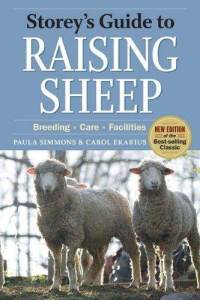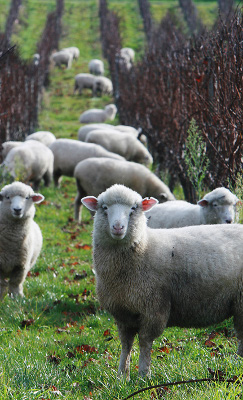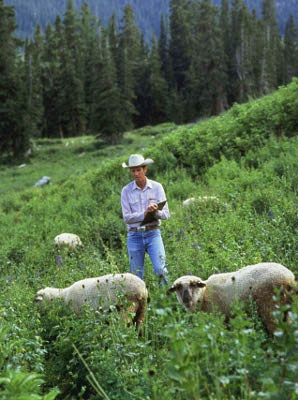
The place of sheep on a homestead
 I've been researching sheep, both by talking with
shepherds and by reading Storey's
Guide to Raising Sheep, and I'm pretty sure these
fluffy livestock are not in our near future. On the plus side,
sheep are very efficient converters of plants into meat and if you
raise them on plenty of good pasture and let them lamb in late spring,
they need little or no supplemental feed or even housing. But the
trick is that sheep really need either high quality pasture (think:
beautiful green lawnlike expanses with lots of clover and other forbs
mixed in) or lots of space. Sheep just aren't going to be happy
with small, rough pastures like you find on a young homestead --- they
can handle small or rough, but not both.
I've been researching sheep, both by talking with
shepherds and by reading Storey's
Guide to Raising Sheep, and I'm pretty sure these
fluffy livestock are not in our near future. On the plus side,
sheep are very efficient converters of plants into meat and if you
raise them on plenty of good pasture and let them lamb in late spring,
they need little or no supplemental feed or even housing. But the
trick is that sheep really need either high quality pasture (think:
beautiful green lawnlike expanses with lots of clover and other forbs
mixed in) or lots of space. Sheep just aren't going to be happy
with small, rough pastures like you find on a young homestead --- they
can handle small or rough, but not both.
That said, established
homesteads and farms can often benefit from sheep. These critters
are very good at:
 Grazing large expanses of
high and dry, subprime pasture that can't be used for anything
else without eroding away.
Grazing large expanses of
high and dry, subprime pasture that can't be used for anything
else without eroding away.- Keeping weeds down in established orchards, vineyards, and Christmas tree plantations. Just make sure you have other pastures to turn the flock into when young growth is present on the plants you care about and use miniature sheep if the trees are short.
- Maintaining well-sodded existing pastures. If you move onto a farm with lots of pastures that are quickly going to weeds, sheep could be a good answer to your mowing problem.
- Mixing in with larger grazers to eat the forbs that cows and horses don't prefer.
If you're trying to run
a flock of sheep with as few inputs as possible on poorer pasture, you
should stick to good foraging breeds. The ones listed in Storey's
Guide to Raising Sheep are Barbados Blackbelly, Black Welsh
Mountain, Border Cheviot (and, presumably, the related Miniature
Cheviot), California Red, Canadian Arcott, Debouillet, Gulf Coast
Native, Hog Island, Icelandic, Karakul, Katahdin (aka Hair Sheep),
Navajo-Churro, Panama, Polypay, Rambouillet, Romanov, Romney, Santa
Cruz, Scottish Blackface, Shetland, Soay, St. Croix, Targhee, Tunis,
and Wiltshire Horn. That said, even this book's sheep-loving
authors recommend that you get a goat if your pastures are overgrown
with brush. They explain that excellent foraging sheep breeds
will eat the leaves on the trees, but won't go after the twigs.
 I think that if our homestead
was ever established enough that we felt it had sheep-friendly
pastures, we'd follow our neighbors' lead and get full size Hair
Sheep. The more I read about sheep, the more sheering sounds like
a hassle, especially since sheep are reputed to be skittish --- I can
just imagine trying to sheer our half-tame cat, Strider, and am not
relishing the image. Hair Sheep don't need to be sheered since
they naturally shed their hair, and they are also excellent foragers,
are docile and hardy, and lamb easily. Plus, since lots of people
in our county raise them, we would be able to keep just a couple of
ewes and rent a ram when needed.
I think that if our homestead
was ever established enough that we felt it had sheep-friendly
pastures, we'd follow our neighbors' lead and get full size Hair
Sheep. The more I read about sheep, the more sheering sounds like
a hassle, especially since sheep are reputed to be skittish --- I can
just imagine trying to sheer our half-tame cat, Strider, and am not
relishing the image. Hair Sheep don't need to be sheered since
they naturally shed their hair, and they are also excellent foragers,
are docile and hardy, and lamb easily. Plus, since lots of people
in our county raise them, we would be able to keep just a couple of
ewes and rent a ram when needed.
The other point against
becoming a shepherd even if we had excellent pastures and steered clear
of sheering is that I'm not sure they mesh with our land and
lifestyle. As one of our readers mentioned, sheep are extremely
prone to internal parasites, and most of these parasites thrive in low,
wet areas --- sounds like our farm. Another big problem with
sheep is that they often need help lambing if you don't want to risk
the mother and/or lamb dying a premature death. That means
shepherds spend a lot of wakeful nights out with the sheep, and Mark
can attest to the fact that I'm not a pleasant person if I don't get my
nine hours of sleep every night. Maybe we'll just stick to buying
lamb from Megan?
Want more in-depth information? Browse through our books.
Or explore more posts by date or by subject.
About us: Anna Hess and Mark Hamilton spent over a decade living self-sufficiently in the mountains of Virginia before moving north to start over from scratch in the foothills of Ohio. They've experimented with permaculture, no-till gardening, trailersteading, home-based microbusinesses and much more, writing about their adventures in both blogs and books.
Want to be notified when new comments are posted on this page? Click on the RSS button after you add a comment to subscribe to the comment feed, or simply check the box beside "email replies to me" while writing your comment.

The trick with sheep doesn't seem to be heat so much as wet and quality of pasture. I'll bet your friend either had good pasture or lots of it?
I'm a strong believer that any kind of meat tastes great as long as you cook it right.
Over the years I've spent time in New Zealand several times. They raise a lot of sheep there. On huge pieces of these islands, where there were once giant forests, there is now only grassland.
Personally I think that is a huge loss. The forests are diverse and teeming with life. On the grasslands there seems to be little but grass and sheep.
Keep your forest garden instead, I'd say.
There are two ways of looking at the issue you mentioned. The first is to blame it on the sheep, but I'm more inclined to blame it on the people. The more people that are present, the more acreage you have to commit to growing food, whether that's row crops, pasture, or what have you. Sheep are supposed to be one of the most efficient converters of plant life to animal protein, so what you're seeing might be the best of the options give people's tendency to have a bunch of kids and need to feed them.
I'll definitely keep researching forest pastures, but in the young stages, I've found that I only get about a quarter as much animal feed per unit area as I do with more traditional pastures. Now, that will hopefully be improved drastically when our tree crops start to come into production, but there is a place for the grassy, lawn-like expanses if you want to grow animals.
Since sheep generally don't keep themselves, isn't it by default the responsibility of the people? New Zealand breeds a lot of sheep but mainly for export rather than feeding themselves, AFAIK. Their economy depends for the most part on agriculture and tourism. And it would be hypocritical for me to judge them on that since the Netherlands are a large exporter of argicultural produce as well. So I won't.
New Zealand breeds a lot of sheep but mainly for export rather than feeding themselves, AFAIK. Their economy depends for the most part on agriculture and tourism. And it would be hypocritical for me to judge them on that since the Netherlands are a large exporter of argicultural produce as well. So I won't.
But I've seen what remains of the native forests of New Zealand. I've seen Tāne Mahuta and was deeply impressed. And even the non-native redwood forest is breathtakingly beautiful.
There was a small forest near to where I grew up, and I played there as a kid. So all I'm saying as my personal view (and maybe not even a rational one) is that it is a shame that such a diverse ecosystem as a forest is reduced to pasture.
It's an adage my mom raised us with. We raised sheep and cows, and mom always hated the sheep. The problems that sheep got themselves into always created problems for us, and lots of midnight quick fixes to many things around the property.
Also good to note, much of the British countryside where sheep have been raised has completely changed due to the sheep's grazing. They are very violent grazers, meaning they will rip and tear anything around. The English country is largely devoid of trees now, and the sheep is the main reason.
Chris --- I've noticed that people seem to have livestock that suit their fancy and ones that don't, just like there are cat and dog people. I've talked to a few different people who've kept both sheep and goats, and some loved their sheep --- so restful! --- while others loved their goats --- so personable! I think the trick is to know the trouble points of each breed and work around them --- making the sheep stupidity or goat curiosity work for you.
In terms of what sheep do to the ground, my answer is the same as it is to Roland above. If you understand the way livestock eat and graze them appropriately, they won't cause damage. On the other hand, if you try to put too many animals on too little land, don't rotate, etc., just about any livestock will devastate the pasture.
We've been trying out a few Katahdins on our land (four of ewes). We've been grazing them on rotation with electronet in an area that's progressively being planted out as an orchard.
The pasture is horrible. It was overgrazed for years by horses and the soil is poor. But the Katahdins have done very well. Our stocking rate is very low to help the pasture recover. As it does, the Katahdins seem to avail themselves of the returning biodiversity. They prefer grass, but will quickly eat-up things I would have sooner left for a goat: fieldrose, locust, blackberry, goldenrod, joe pye weed. We give them a salt block and some grain every few weeks (mostly in order to lead them), and they seem to be fat, feisty, happy animals.
My one caveat is that we have not lambed them. I think we could if we rotated the pasture better and made sure our rotation choices were based on their needs rather than ours (which is how we do it now), but it's hard to know until you try.
Anyway, I've been very happy with how these gals have worked out.
Thanks for sharing your experience, David! Katahdins are what people around here raise for precisely that reason --- they're so good in scrub. They do seem like a very good choice for converting sadly neglected pasture back into productive space.
You say your stocking rate is low -- if you check back, I hope you'll be more specific. I'd be curious to hear if you're grazing your four ewes on an acre, two acres, five acres, etc.